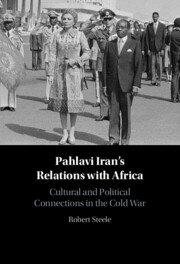Book contents
- Pahlavi Iran’s Relations with Africa
- Pahlavi Iran’s Relations with Africa
- Copyright page
- Contents
- Figures
- Acknowledgements
- Note on Transliteration
- Introduction
- Part I Establishing Relations (c. 1957–1970)
- 1 Iran, Egypt and the Spectre of Nasserism
- 2 Iran, North Africa and Islamic Solidarity
- 3 ‘Creating Influence and Dialogue with the African Continent’ (1960–1968)
- 4 Establishing Ties with Apartheid South Africa
- Part II Forming an Africa Policy (1971–1975)
- Part III Africa and Pahlavi Iran’s Grand Strategy (1976–1979)
- Conclusion
- References
- Index
1 - Iran, Egypt and the Spectre of Nasserism
from Part I - Establishing Relations (c. 1957–1970)
Published online by Cambridge University Press: 13 June 2024
- Pahlavi Iran’s Relations with Africa
- Pahlavi Iran’s Relations with Africa
- Copyright page
- Contents
- Figures
- Acknowledgements
- Note on Transliteration
- Introduction
- Part I Establishing Relations (c. 1957–1970)
- 1 Iran, Egypt and the Spectre of Nasserism
- 2 Iran, North Africa and Islamic Solidarity
- 3 ‘Creating Influence and Dialogue with the African Continent’ (1960–1968)
- 4 Establishing Ties with Apartheid South Africa
- Part II Forming an Africa Policy (1971–1975)
- Part III Africa and Pahlavi Iran’s Grand Strategy (1976–1979)
- Conclusion
- References
- Index
Summary
This chapter explores the relationship between Iran and Egypt during the 1950s and 1960s, placing it in a regional context. The two countries forged close ties during the 1930s, when the Iranian crown prince, Mohammad Reza Pahlavi, married Egyptian Princess Fawzia Faud. Shared histories of colonial interference shaped the friendship between Egypt and Iran during the oil nationalisation crisis, yet in the years after the 1952 coup in Egypt, which brought down the monarchy and ultimately brought Nasser to power, Egypt and Iran’s paths diverged. At the Bandung Conference in 1955, while Nasser was inspired by the prospects of Afro-Asian solidarity, the shah’s government was concerned with the need for moderation, and to maintain close ties to the West. One year later, after the nationalisation of the Suez Canal, Nasser became the leading voice of pan-Arabism, which the shah viewed as a major threat both to regional security and to his reign. This divergence in perceptions of their places in the Global South ultimately led to a break in relations between Iran and Egypt. This chapter examines in detail the events that led to this fracture, and the ultimate emergence of Nasser as the shah’s main adversary.
- Type
- Chapter
- Information
- Pahlavi Iran's Relations with AfricaCultural and Political Connections in the Cold War, pp. 19 - 40Publisher: Cambridge University PressPrint publication year: 2024

